Domestic Workers Fight for their Rights | News Report: July 2023
31/07/2023
After a long hiatus, here’s our news roundup report for July 2023, compiling news about migrants and refugees in Lebanon, and the region.
Articles and views shared in the News Report do not necessarily represent ARM’s views. Information in these articles has not been fact-checked by ARM and may contain some errors. ARM is simply compiling all news relevant to migrant communities to inform our advocacy efforts and to facilitate the work of organizations that cater to migrant communities.
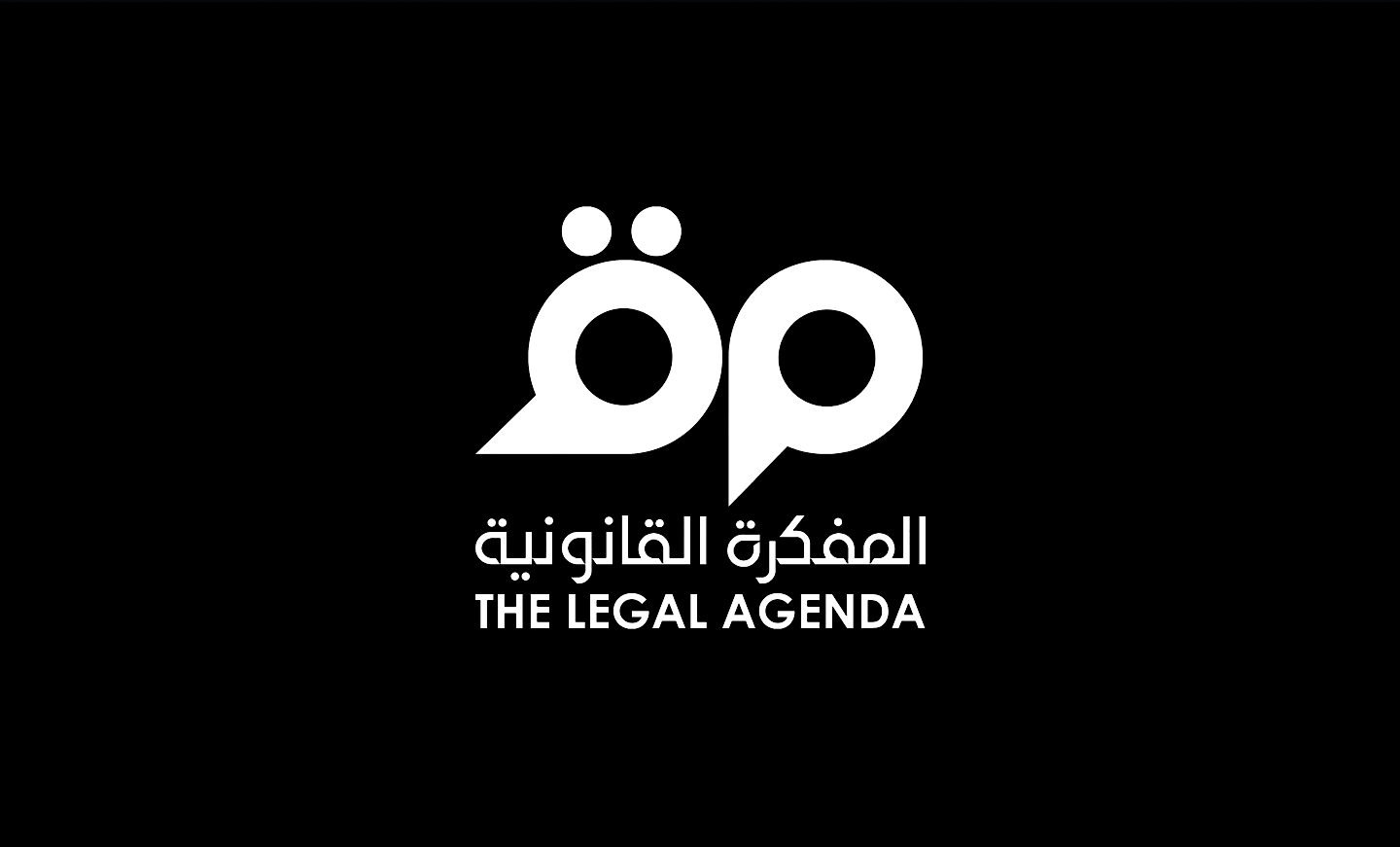
Employer and Medical Examiner Charged with Homicide after an Ethiopian Domestic Worker Died in Bekaa [here]
Mulu Mikasha Nagasi, an Ethiopian worker aged 35, died after being transferred to the hospital in critical condition in the Bekaa region.
The public prosecution has taken legal action after evidence of bruises and wounds was discovered on the worker’s body, leading to the accusation of the employer and the forensic doctor for causing her death through violence and negligence in providing her with medical care.
Bekaa’s Public Prosecutor, Judge Munif Barakat, accused the employer of causing the death of the worker under Article 550 of the Penal Code, which imposes a punishment of no less than 5 years of hard labor for causing death without intent to kill. The punishment could extend to 7 years in this instance, according to the Legal Agenda.
Additionally, the forensic doctor was accused of providing a false certificate to the authorities, omitting the presence of bruises and scratches on the body of the worker upon examination, under Article 466 of the Penal Code, which carries a penalty of imprisonment between two months and two years.
This charge considers the possibility that the employer might have used torture or violence against the worker, given the bruises found on her body, and the potential coercion to make her work despite her serious illness.
The situation of exploitation, lasting for seven years, necessitates additional investigation, particularly to verify her payment, potential confinement, forced labor, or deprivation of food.
The decision marks one of the rare instances in which an employer is held accountable for the death of a migrant domestic worker, the only instance of a similar charge was from 1999, when an employer, who beat a worker to death, was sentenced to prison for 1 year and a half.
Migrant domestic workers’ deaths are often classified as suicides, and their deaths are not often investigated, especially when there is no direct evidence of physical assault or harm, which means that such decisions could be used by lawyers and judges for strategic litigation in future cases.
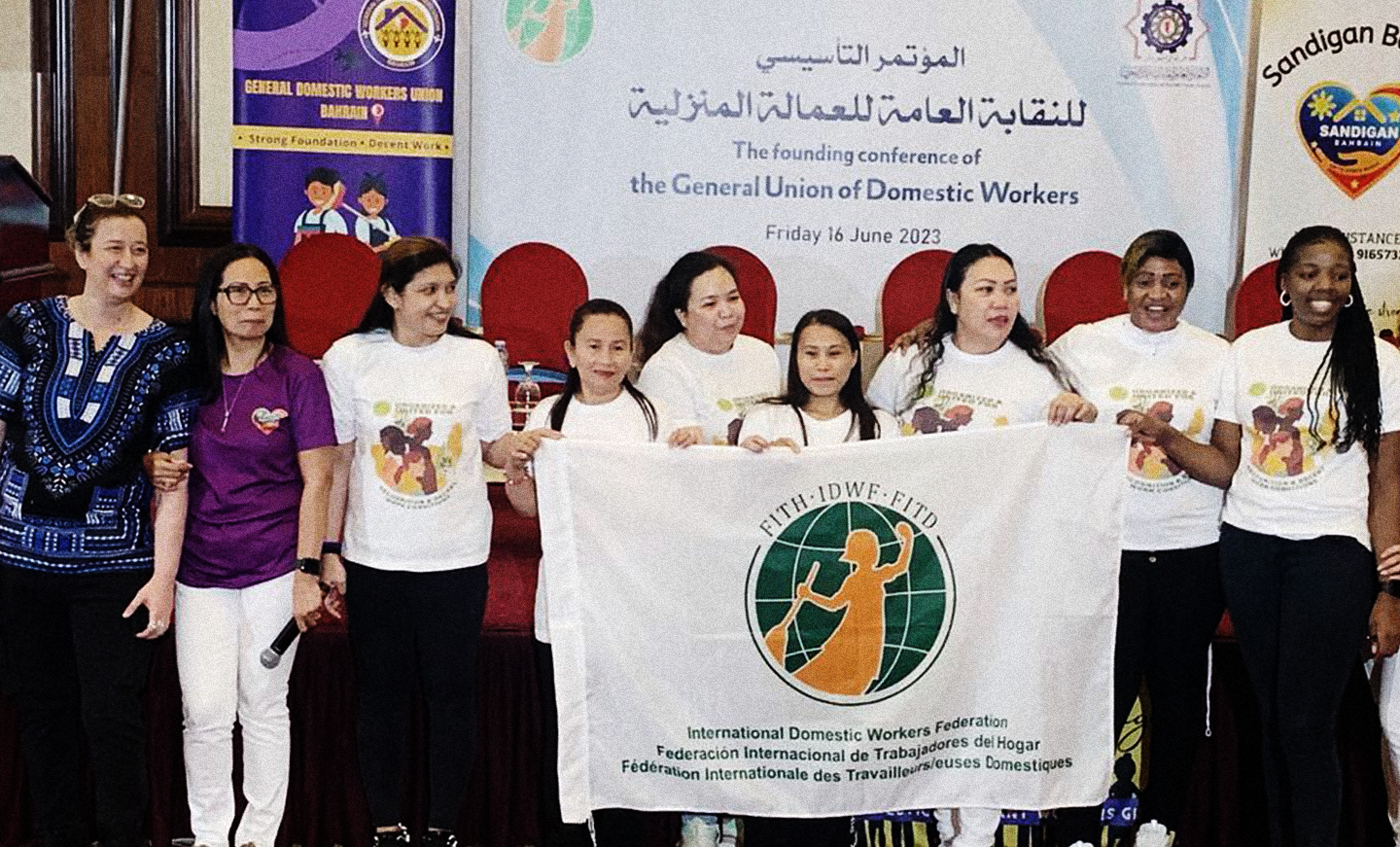
International Organizations Establish the First Union for Domestic Workers in Bahrain and the Gulf [here]
On the occasion of International Domestic Workers Day, the International Labor Organization (ILO), the International Domestic Workers Federation (IDWF), and the General Federation of Bahrain Trade Unions (GFBTU) fostered the establishment of the first union in the Gulf countries concerned with the rights of domestic workers in Bahrain.
The newly founded General Domestic Workers Union (GDWU) was quickly met with opposition from the public. Sponsors rushed to voice their “fear” over the union undermining their “rights.”
Most notably, the Chairman of the Services Committee in the Bahraini Parliament, Mamdouh Al-Saleh, criticized the establishment of a general union for domestic workers, considering it “a futile rhetoric and a fruitless endeavor”.
Al-Saleh called on the General Federation of Bahrain Trade Unions to contribute to the creation of legislation and laws that protect “the sponsor (Kafeel) of domestic workers” and those in their care in cases of escape, theft, or vandalism, saying that it is more appropriate and beneficial for protecting the rights of citizens.
The Secretary General of the General Federation of Bahrain Trade Unions, Abdul Qadir Al-Shihabi, responds to the attack on the union and the federation by stating that “bullying has become a prevailing norm in society today, and the role of the General Federation is to defend all workers, including domestic workers. They all have rights and responsibilities.”
Edika Samarasenji, a Sri Lankan domestic worker who worked for 30 years in the same Bahraini household, supports the establishment of the union, although she doubts its ability to solve the problems faced by domestic workers in Bahrain and the Gulf.
Samarasenji articulates: “It may be beneficial for hourly workers, but it may not be able to reach full-time live-in domestic workers who reside with families, as the union may not be allowed to communicate with them, and they may not be allowed to communicate with the union.”
Khalil Buhazaa, a legal activist in workers’ rights, told Raseef22: “In general, the labor law aims to achieve a balance between the parties to labor relations, although in many cases it is supposed to strengthen the position of the worker given that they are the weaker party and the main problem in domestic work relations. This sector of work has not been legally regulated in the countries of the Gulf region until recently, and therefore there are many loopholes.”
Buhazaa explains that regulating domestic work relations needs to be comprehensively addressed, calling to dismantle the Kafala system, which is one of the main causes behind the problems that workers and employers fall into.
The rejection of labor unions for migrant domestic workers in the region is nothing new. In Lebanon, the Domestic Workers’ Union, which was established through the Federation of Employees’ and Workers’ Trade Unions of Lebanon (FENASOL) with the support of ILO in 2015, faced hostile reactions from the Ministry of Labor, which declared the union “illegal.”
Furthermore, stigmatizing migrant domestic workers through narratives related to “escape, theft, vandalism…etc,” incites racism against them and opens the way for employers to exploit workers, limiting their freedoms under the guise of “ensuring safety from escape or theft.”
Additionally, the lack of labor laws and regulations with strict enforcing mechanisms that aim to balance the work relations between employers/sponsors and workers is a major indicator of the need to establish a labor union that can foster the needs of workers and strengthen their position.
With that said, unionizing is only one tactic in the face of exploitation, and the only way for workers to be able to achieve labor justice is through dismantling the Kafala system.

Report about Domestic Workers, Sponsors, and Recruitment Agencies in Jordan: Accusations of Wage Theft, Forced Labor and Trafficking [here] و [here]
Roya, a Jordanian media outlet and broadcast television station, has published an extensive investigative report and a live debate on the situation of migrant domestic workers in Jordan, the exploitative practices of employers and sponsors, recruitment agencies, and their shady business of human trafficking.
The report includes multiple testimonies from domestic workers confirming financial exploitation, blackmail, and forced transfer of sponsorship, which costs between 3000-4000 JOD (around 4,200-5,600 USD).
The report unjustly frames workers as fugitives and fails to acknowledge the inherent failure of the Kafala system and the responsibility of recruitment agencies and state institutions which constitute its foundations.
Instead, the report uses sensationalist language when representing workers who leave the employers’ workplaces, referring to them as “escapees,” and representing them as a security threat.
Rand (alias name), a worker from the Philippines, explained that one sponsor financially blackmailed her into paying 3000 JOD to transfer her sponsorship, or else, she would falsely accuse her of theft.
Linda Kalash, the Executive Director of the “Tamkeen” Human Rights Center, an NGO points out several issues that domestic workers face upon arriving in Jordan.
One issue is that they were uninformed (likely by recruiters) about the family size, house size, nature of work, or the inability to communicate with the family, as well as culture shock, for example, shock about the weather or customs and traditions.
The Executive Director of Tamkeen confirmed that the center reported cases of human trafficking, through brokers and smugglers, sometimes of Jordanian nationality, who deliberately smuggled female workers and exploited them by working in various places.
One worker (NA), of Sri Lankan nationality, arrived in Jordan in 1996 and worked for the employer until 2019 without receiving any wages.
In addition to making her believe that all her family had died in the civil war in Sri Lanka, the employer also confiscated her passport and did not issue her work permits and residency.
The worker contacted Tamkeen by phone on January 22, 2019, asking for help and saying that the employer imprisoned her. Tamkeen informed the Anti-Human Trafficking Unit of the available information, and the court fined the employer 100 JOD (around 140 USD), which can be least described as a disproportionate legal punishment for 23 years of wage theft.
Kalash emphasized that Tamkeen has observed cases of unpaid wages for periods ranging from 10 years to 23 years, as well as cases of non-renewal of work permits and residence permits, and the accumulation of fines. These factors, along with the working environment, may lead the worker to quit their job, something that the report framed as an unlawful “escape.”
The report also mentions the citizens who “complain” about domestic workers “running away”, preventing them from working or being accused of “various charges” to escape or be smuggled for the benefit of illegal networks, seeking higher financial gains than their regular monthly employment.
These claims are, more often than not, exaggerated and presented as “facts” in order to incite further racism and discrimination against migrant communities. For example, agencies claim the reason behind so-called “runaway workers” is the laws passed that give domestic workers an advantage.
Such claims falsely portray workers as the ones exploiting the laws and harming employers, when in reality, it’s the lies, deception, and practices of recruiters and sponsors that are exploitative, and workers suffer mentally, financially, and physically in ways that are almost incomparable because of the unbalanced power dynamics.
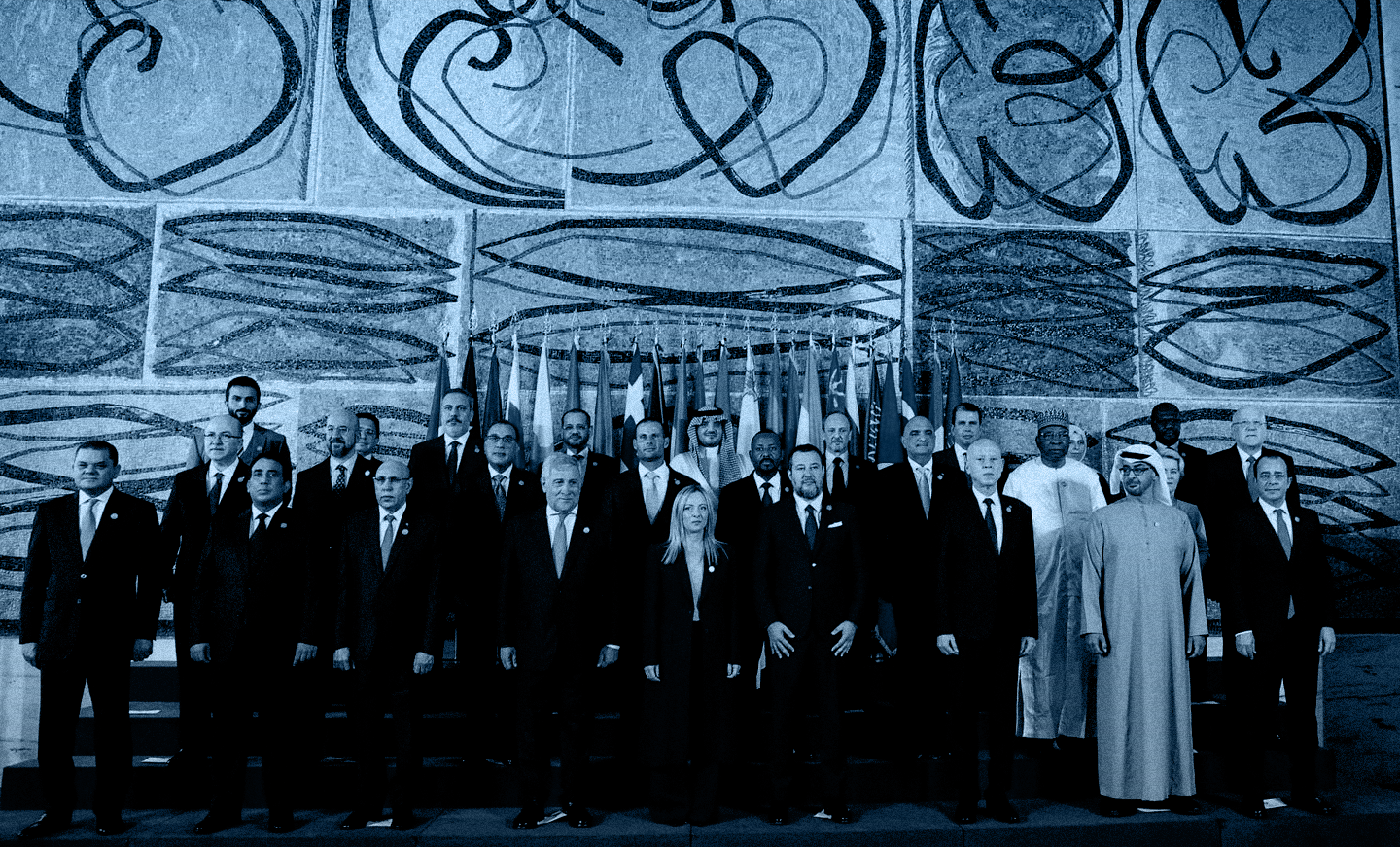
Mikati Denounces EU Parliament’s Resolution to Improve the Situation of Refugees in Lebanon [here] و [here]
The EU Parliament voted in favor of a resolution that addresses the political and economic situation in Lebanon, more specifically in relation to the presidential election, the investigation into the August 4 blast, and the situation of refugees in Lebanon.
حركة مناهضة العنصرية هي حركة شعبيّة أنشأتها جهات شبابيّة ناشطة في لبنان بالتعاون مع عمّال وعاملات أجانب. نعمل معًا في الحركة على توثيق الممارسات العنصرية والتحقيق فيها وفضحها ومحاربتها من خلال مبادرات وحملات عديدة. تمّ resolution does not consider Syria a place where “safe return” can be guaranteed and emphasizes the importance of improving the livelihood of Syrian refugee communities.
Additionally, it does not “explicitly call for Syrian refugees to remain in Lebanon.” On the contrary, it “stresses that the return of refugees should be voluntary, dignified and safe, according to international criteria,” which seems to contradict the EU Parliament’s worry over the safety of return to Syria.
Lastly, the resolution expressed concern over the increasing incitement and discrimination against Syrian refugees, calling to “refrain from expelling, imposing discriminatory measures and inciting hatred against Syrian refugees.”
Nevertheless, Prime Minister Najib Mikati expressed “disappointment” with the resolution, referring to it as “an attack on Lebanon’s sovereignty,” and praising the “vigilance” of the Lebanese Armed Forces “in the face of the refugee crisis.”
It’s unclear what Mikati means by “vigilance” especially given that Human Rights Watch “reported that Lebanon had arrested more than 2,000 Syrians and deported 1,800 since April amid increasingly aggressive policing of displaced Syrian communities in Lebanon and a rise in anti-Syrian refugee rhetoric.”
Even though activists have raised the alarm about the “dangerous conditions” in Syria, deportations remain ongoing, without any regard for the safety and dignity of refugees.
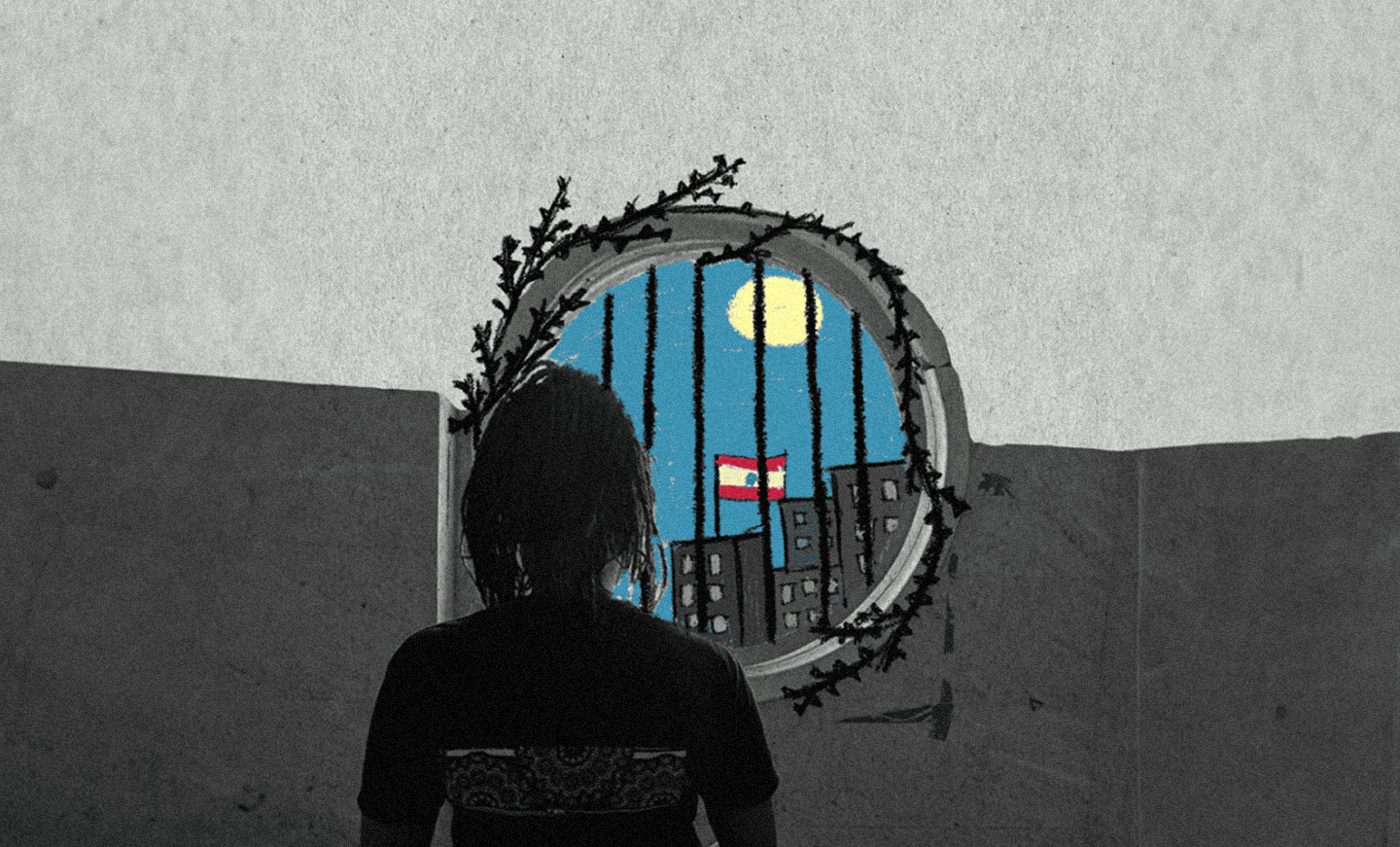
“I Am Afraid”: Cameroonian Fashion Designer Viany De Marceau Shares her Story of Migration to Lebanon [here]
Migrant Workers Action (MWA) published an entry titled “J’ai Peur (I Am Afraid)” on their blog “Volume Up!”
The author, Viany De Marceau, a Cameroonian Fashion Designer living in Lebanon, shares her account of travel and work on the basis of a false promise made by a woman, who turned out to be a trafficker.
The trafficker told Viany that after she finishes working as a domestic worker for 6 months, she will be able to use her salary to do the paperwork necessary to travel to France and study fashion design.
However, when it was time for Viany to travel to France, the employer refused. “You came here to work,” she said, “and you have nothing else to do but work. You cannot leave without my permission. You are mine. If I could, I would be the one to go to France, not you.”
This kind of false promise is very common among recruiters to trap workers under the Kafala system: “a form of slavery and human trafficking,” as Viany explains.
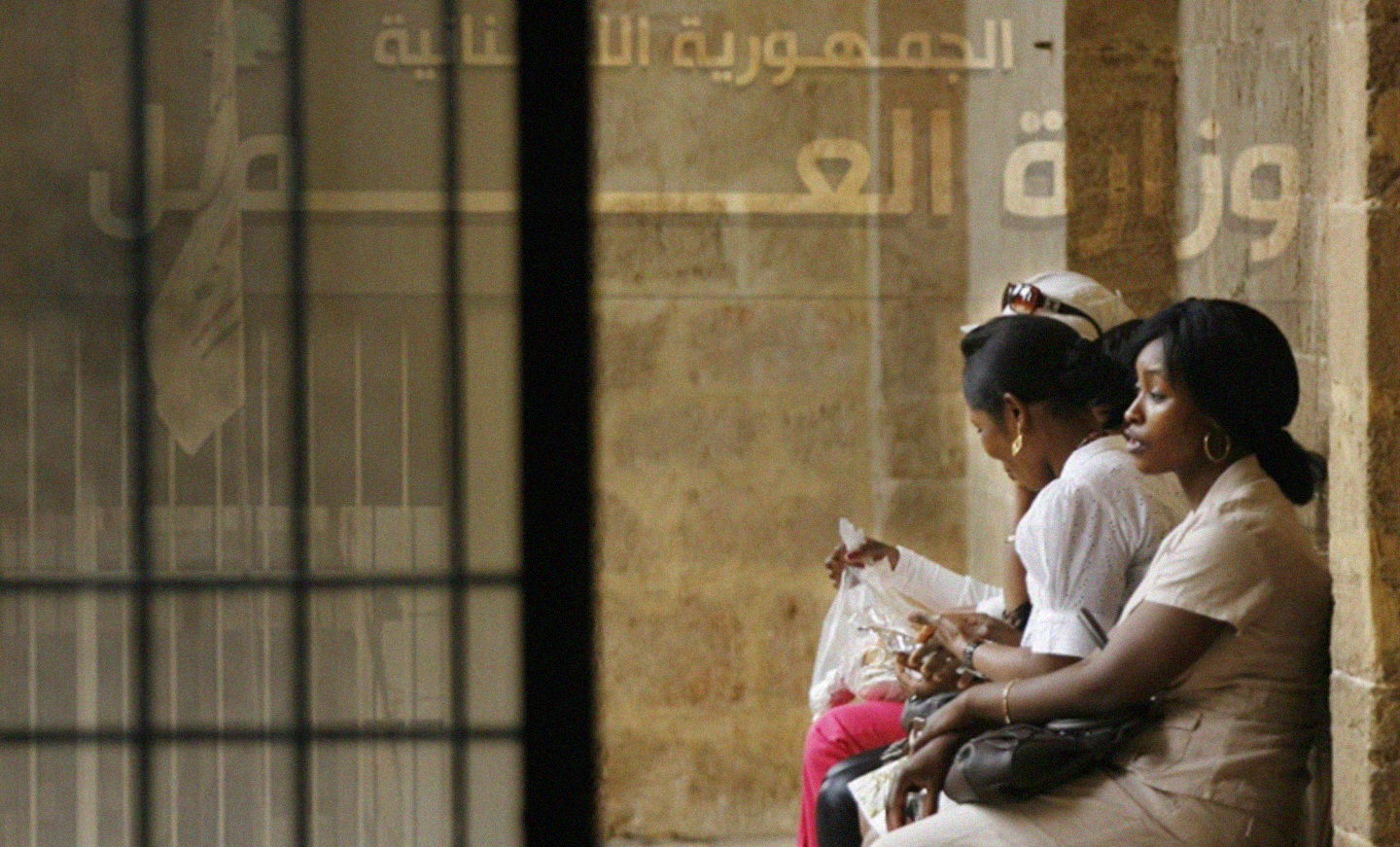
Ministry of Labor Orders the Closing of 2 Recruitment Agencies for Violating Laws and Regulations [here]
The Minister of Labor in the caretaker government, Moustafa Bayram, issued a decision to close two offices for recruiting domestic workers, as they violated laws, regulations, and valid procedures. This comes within the framework of regulating recruitment agencies that employ practices akin to human trafficking.
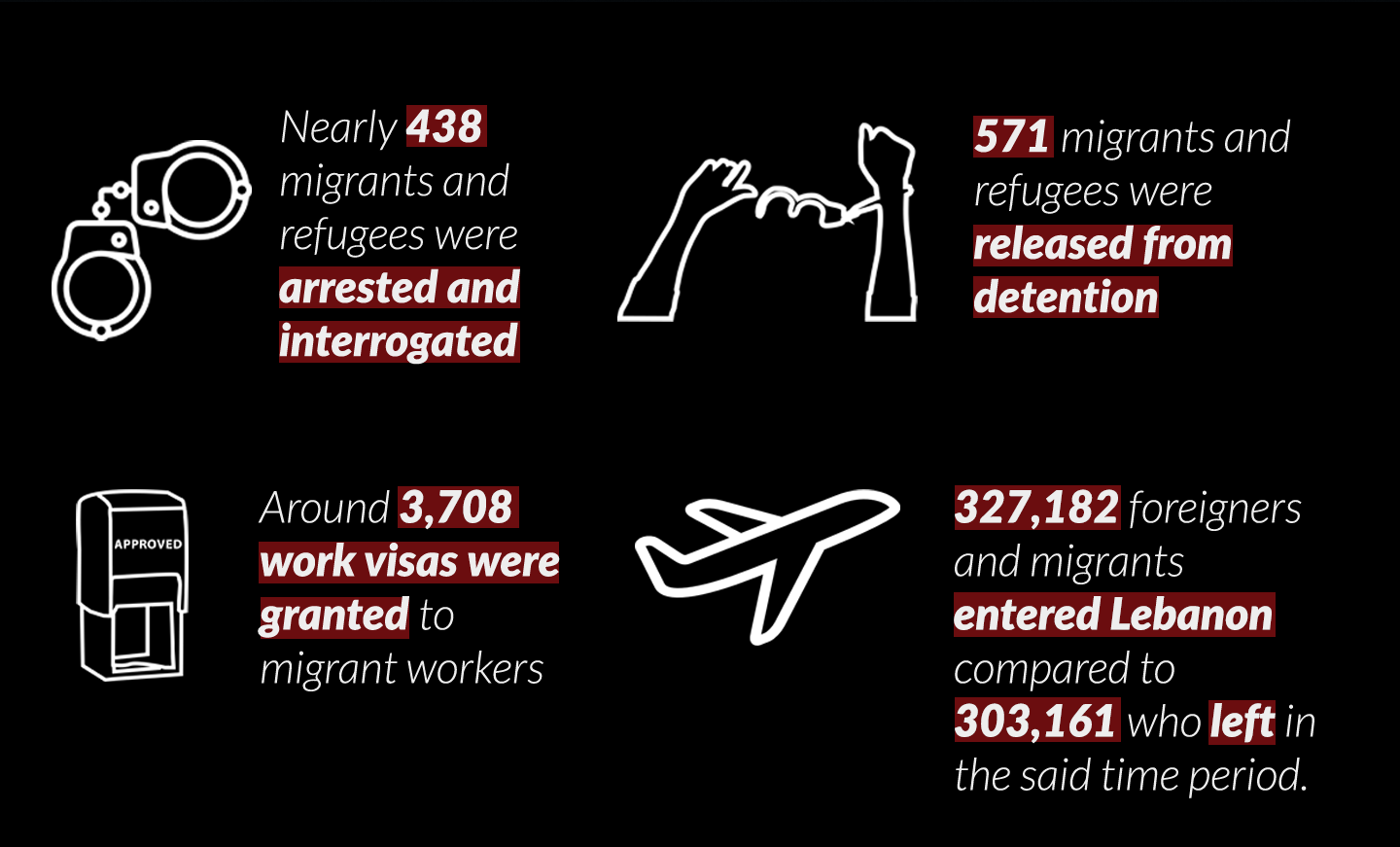
General Security Publishes List of Arrests, Entry/Exit, Work Visas Disaggregated by Nationality from Mid-May to Mid-June [here]
The General Security Office (GSO) published a breakdown of arrests, entry/exit, and work visas between mid-May and mid-June in the new issue of the GS journal released on July 5th. Highlights included the following:
- Nearly 438 migrants and refugees were arrested and interrogated;
- 571 migrants and refugees were released from detention after interrogation;
- Around 3,708 work visas were granted to migrant workers mostly from Ethiopia, Bangladesh, and the Philippines. There is no information on how many of these work permits were granted to newcomers.
327,182 foreigners and migrants entered Lebanon compared to 303,161 who left in the said time period.
مقالات مشابهة
لديك أي أسئلة؟
للاستعلام عن هذا البيان والسياق ، راسلنا عبر البريد الإلكتروني أو املأ النموذج.
إشتركوا في النشرة الإلكترونية
نعمل في حركة مناهضة العنصرية بجهد على العديد من النشاطات والمبادرات المختلفة. معظم نشاطنا تعدّ في الإمكان بفضل فريق من المتطوعين/ات يعمل مع فريقنا الأساسي بشغف و إخلاص.
حركة مناهضة العنصرية هي حركة شعبيّة أنشأتها جهات شبابيّة ناشطة في لبنان بالتعاون مع عمّال وعاملات أجانب. نعمل معًا في الحركة على توثيق الممارسات العنصرية والتحقيق فيها وفضحها ومحاربتها من خلال مبادرات وحملات عديدة. تمّ إطلاق حركة مناهضة العنصرية عام 2010 عقب حادثة وقعت في أحد أكثر المنتجعات البحرية الخاصّة المعروفة في بيروت.